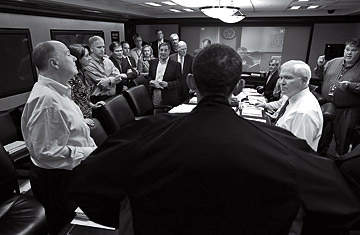
Mission Accomplished. Obama and his team after watching the strike unfold on a live feed from Pakistan.
(3 of 7)
In today's Washington, a week is a lifetime. Secrets are often published overnight, as Obama learned painfully in 2009 when he attempted to consider his options in Afghanistan. He found himself "jammed" — his word — into a decision he opposed by a process that began when he asked his new commander in Afghanistan, General Stanley McChrystal, to assess the situation. When Obama received McChrystal's dire 66-page brief that warned of imminent defeat unless a major initiative was undertaken to "reverse the momentum," the President was shocked. Before he could meet with his national-security team to discuss his options, McChrystal's report appeared in the press. From that point on, he had only two choices: to back his new commander or back down.
That outcome, in part, eventually led Obama to replace James Jones, his National Security Adviser, with Jones' deputy, Tom Donilon. Obama then asked Donilon to create a substantially revised and more actively managed national-security decisionmaking process, one that met Obama's demands for thinking before acting, analyzing every angle of an issue and probing the competing views of his advisers but in the end making his own call. As Donilon explains it, using the somewhat lifeless language of policy managers, his job is to "maximize the President's optionality."
In most journalists' accounts, Obama's decision to order a strike on bin Laden's compound was easy. "Take the view of the man in the street," Panetta said. "If ordinary Americans knew what we knew, they would think it was a no-brainer to go." But when we stop to consider the choices Obama actually faced, the story becomes more complicated and more interesting. Hunters know that the toughest choice they face is when to fire. If they shoot too soon, they will miss the mark, allowing the kill to escape. But by waiting, they risk that a sound will be made that will spook the target. And yet Obama waited five months after first hearing about bin Laden's whereabouts and acting.
And if this had been, as Panetta suggested, a straightforward decision, why did his Vice President, the Secretary of Defense and the key military leader involved disagree with Obama's choice, even after the President's preference was clear? In the final meeting before the operation, the President took a vote. The most experienced member of this national-security team, Defense Secretary Robert Gates, opposed the raid, restating his view that putting commandos on the ground risked their being captured or killed. Vice President Joe Biden also felt that the risks of acting rather than waiting outweighed the benefits. The military leader in the loop from the outset and the most intensely engaged officer in this decisionmaking process, Joint Chiefs of Staff [JCS] Vice Chairman James Cartwright, preferred an air strike to boots on the ground.
"It's Time to Call In the Pros"
In the weeks that followed Panetta's visit to the White House, CIA Deputy Director Michael Morell gave Donilon and Brennan regular intelligence updates, but virtually no one else. The Abbottabad material was so compartmented that it was excluded from the threat matrix in the President's supersecret daily brief out of fear that it would raise flags at the departments of State and Defense and other agencies.
